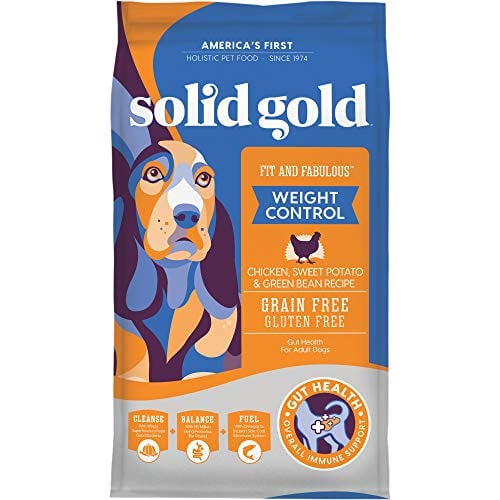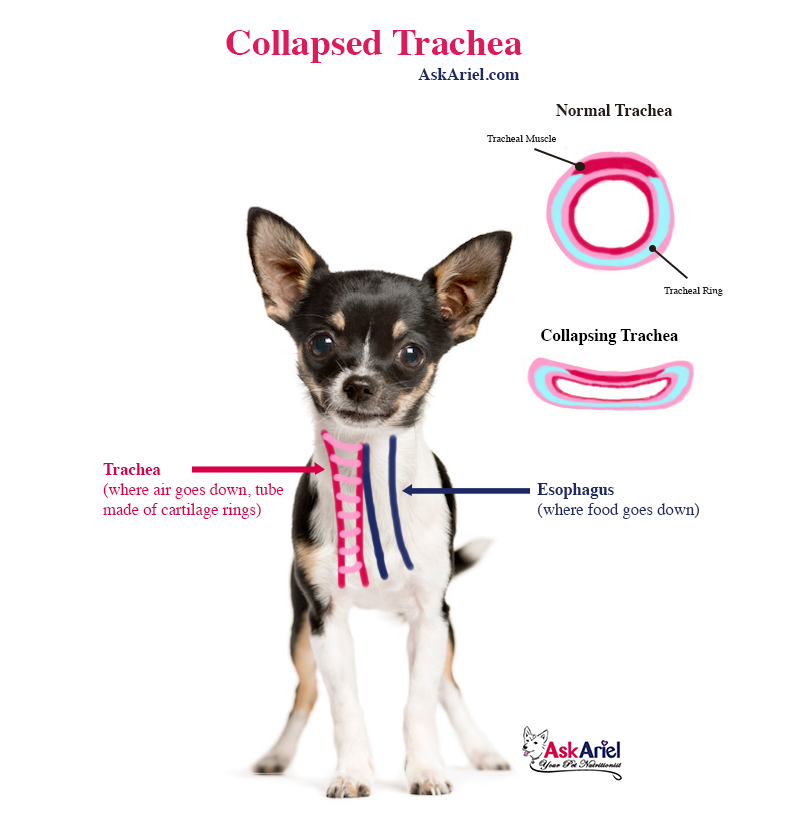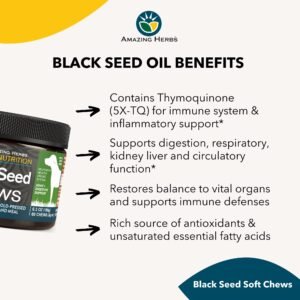A collapsed trachea in dogs can be a serious condition. It affects their breathing and overall health. So let’s jump in: What to Feed Dog With Collapsed Trachea?
Choosing the right food becomes crucial for managing this issue. Dogs with a collapsed trachea often experience coughing and difficulty breathing. A proper diet can help reduce these symptoms and improve their quality of life. Soft foods are usually better since they are easier to chew and swallow.
Nutrient-rich options can support their overall health. Hydration is also essential, as it keeps the throat moist and comfortable. Understanding what to feed your dog is important for their well-being. In this guide, we will explore the best food choices for dogs with a collapsed trachea, ensuring they stay healthy and happy.
Table of Contents
Introduction To Collapsed Trachea In Dogs
Collapsed trachea is a serious condition in dogs. It occurs when the trachea, or windpipe, becomes weak and collapses. This can lead to breathing problems. Small dog breeds are more likely to have this issue. Common breeds include Yorkshire Terriers, Pomeranians, and Chihuahuas. Understanding this condition is important for proper care.
Symptoms And Diagnosis
Recognizing the symptoms of a collapsed trachea is crucial. Common symptoms include:
- Dry cough that sounds like a honk
- Difficulty breathing or wheezing
- Exercise intolerance or fatigue
- Blue-tinged gums in severe cases
If you notice these signs, consult a veterinarian. The vet will perform a physical exam. They may use X-rays to confirm the diagnosis. In some cases, a bronchoscopy may be needed to examine the trachea.
Impact On Canine Nutrition
Nutrition plays a key role in managing a dog’s health. For dogs with a collapsed trachea, diet can help improve their condition. Here are some important considerations:
| Food Type | Benefits |
|---|---|
| Soft food | Easy to chew and swallow |
| Moist food | Helps keep the throat lubricated |
| High-quality protein | Supports overall health and muscle strength |
Choose food that is low in fat. Avoid ingredients that can cause allergies. Stay away from large kibble that may irritate the throat. Regular feeding schedules help maintain a stable weight. This is important for dogs with breathing issues.
Consider consulting a vet for personalized recommendations. They can suggest specific brands and recipes. Careful nutrition can support your dog’s recovery and quality of life.

Credit: www.rover.com
The Role Of Diet In Managing Tracheal Collapse
A proper diet helps dogs with tracheal collapse. The right food can support their respiratory health. It can reduce symptoms. Focusing on nutrition is essential. It provides your dog with strength and comfort.
Nutritional Needs For Respiratory Health
Dogs with tracheal collapse need specific nutrients. A balanced diet supports their immune system. Here are key nutrients to include:
- Protein: Helps with muscle repair and overall health.
- Omega-3 Fatty Acids: Reduces inflammation and supports lung function.
- Antioxidants: Protects cells from damage and boosts immunity.
- Vitamins: Essential for overall health. Look for Vitamin C and E.
- Fiber: Aids digestion and helps maintain a healthy weight.
Consider high-quality dog food. Look for formulas designed for respiratory health. Consult your vet for specific recommendations.
Avoiding Foods That Exacerbate Symptoms
Some foods can worsen tracheal collapse symptoms. Avoid the following:
| Food Type | Reason to Avoid |
|---|---|
| High-fat foods | Can lead to obesity and stress the trachea. |
| Highly processed foods | May contain additives that irritate the throat. |
| Grains | Some dogs have sensitivities that can cause inflammation. |
| Spicy foods | Can irritate the throat and worsen coughing. |
Always read ingredient labels. Choose natural, wholesome options. Your dog’s comfort depends on their diet.
Wet Food Vs. Dry Food
Feeding a dog with a collapsed trachea requires careful choices. The decision between wet food and dry food can impact their health. Each option has its benefits and drawbacks. Understanding these can help you choose the best diet for your dog.
Pros And Cons For Tracheal Health
| Type of Food | Pros | Cons |
|---|---|---|
| Wet Food |
|
|
| Dry Food |
|
|
Texture And Consistency Considerations
The texture of your dog’s food matters greatly. A soft texture can help dogs with a collapsed trachea. Wet food is often softer and easier to swallow. It reduces the risk of coughing or choking.
Dry food can be difficult for some dogs to chew. It may cause them to cough more. Look for soft kibble options if choosing dry food. Always consider your dog’s preferences. A happy dog will eat better.
Mixing both wet and dry food can be beneficial. This approach provides variety and keeps meals interesting. Monitor your dog’s response to different foods. Adjust the diet as needed for their comfort and health.
Homemade Meals For Dogs With Collapsed Trachea
Feeding a dog with a collapsed trachea requires special care. Homemade meals can provide your dog with the right nutrients. These meals can help support their respiratory health. Let’s explore some balanced recipes and safe ingredients.
Balanced Recipes For Respiratory Support
Creating balanced meals is key. Here are some simple recipes:
- Chicken and Rice
- 1 cup cooked chicken (shredded)
- 1 cup brown rice
- 1/2 cup carrots (cooked and chopped)
- Turkey and Sweet Potato
- 1 cup ground turkey (cooked)
- 1 cup sweet potatoes (mashed)
- 1/2 cup green beans (cooked)
- Fish and Quinoa
- 1 cup salmon (cooked and flaked)
- 1 cup cooked quinoa
- 1/2 cup spinach (cooked)
Safe Ingredients And Portion Sizes
Choose safe ingredients for your dog’s meals. Here are some safe options:
| Ingredient | Benefits |
|---|---|
| Chicken | High in protein, easy to digest |
| Rice | Gentle on the stomach, energy source |
| Sweet Potatoes | High in fiber, supports digestion |
| Green Beans | Low calorie, rich in vitamins |
| Salmon | Omega-3 fatty acids, supports skin and coat health |
| Quinoa | Complete protein, gluten-free |
Portion sizes depend on your dog’s weight. Use the following guideline:
- Small dogs (under 20 lbs): 1/4 to 1/2 cup per meal
- Medium dogs (20-50 lbs): 1/2 to 1 cup per meal
- Large dogs (over 50 lbs): 1 to 2 cups per meal
Adjust portions based on your dog’s needs and activity level.
Recommended Commercial Diets
Feeding dogs with a collapsed trachea requires special attention. Choosing the right commercial diet can help manage symptoms. Look for foods that are gentle on the throat and easy to digest. This section highlights the best brands and how to read dog food labels.
Top Brands For Sensitive Tracheas
Some brands focus on recipes that support dogs with sensitive tracheas. Here are a few top choices:
| Brand | Key Features |
|---|---|
| Hill’s Science Diet | Veterinarian recommended, easy-to-digest ingredients. |
| Royal Canin | Formulated for respiratory health, promotes optimal weight. |
| Purina Pro Plan | High-quality protein, supports respiratory function. |
| Wellness CORE | Grain-free, high in protein, contains antioxidants. |
| Canidae | Limited ingredient diets, easy on the stomach. |
Deciphering Dog Food Labels
Understanding dog food labels is crucial. Look for key terms that indicate quality and safety. Here are some tips:
- Ingredients list: The first five ingredients matter most.
- Protein source: Look for named meats, like chicken or beef.
- Grain-free options: Better for sensitive dogs.
- No fillers: Avoid corn, soy, and artificial additives.
Check for AAFCO statements. These show the food meets nutritional standards. Always choose brands with a good reputation.

Credit: cbddoghealth.com
Supplements For Respiratory Support
Feeding a dog with a collapsed trachea requires careful planning. Choosing the right supplements can help support their respiratory health. Supplements provide essential nutrients that can strengthen their system and ease breathing difficulties. Below are some effective options to consider.
Essential Vitamins And Minerals
Vitamins and minerals play a vital role in a dog’s overall health. For dogs with a collapsed trachea, certain nutrients can support their respiratory function.
| Vitamin/Mineral | Benefits |
|---|---|
| Vitamin C | Boosts immunity and reduces inflammation. |
| Vitamin E | Acts as an antioxidant, supporting lung health. |
| B Vitamins | Supports energy metabolism and overall health. |
| Magnesium | Helps relax muscles and improves airflow. |
Consult your vet before adding any supplements. They can recommend the right dosage for your dog.
Herbal Remedies And Their Benefits
Herbal remedies can provide natural support for dogs with respiratory issues. Many herbs have anti-inflammatory and soothing properties.
- Thyme: Supports lung function and reduces coughing.
- Licorice Root: Soothes the throat and reduces inflammation.
- Oregano: Acts as an antioxidant and supports immune health.
- Ginger: Reduces inflammation and helps with respiratory issues.
Always check with your vet before using herbal remedies. Some herbs can interact with medications. Proper guidance is essential for your dog’s safety.
Feeding Techniques And Tips
Feeding a dog with a collapsed trachea requires special care. Choosing the right techniques is crucial for their comfort. Here are some effective methods to improve mealtime.
Elevated Feeding Positions
Using an elevated feeding position can help your dog breathe easier. This method reduces strain on the trachea. Here are some tips for elevated feeding:
- Use a sturdy raised bowl stand.
- Ensure the height suits your dog’s size.
- Keep the bowls clean and free of debris.
Elevated feeding can lead to:
- Less coughing during meals.
- Improved digestion and comfort.
Pacing And Mealtime Management
Managing your dog’s mealtime is essential. Slow feeding helps prevent choking. Follow these tips for pacing:
- Use a slow feeder bowl.
- Serve smaller portions at a time.
- Encourage breaks between bites.
Other management tips include:
- Feed in a quiet, calm area.
- Avoid sudden movements around your dog.
- Monitor your dog while eating.
These practices can enhance your dog’s eating experience. Comfort is key for a dog with a collapsed trachea.

Credit: www.medvet.com
Monitoring Your Dog’s Condition
Monitoring your dog’s condition is crucial. A dog with a collapsed trachea needs special care. Diet plays a vital role in managing symptoms. Watch for signs of improvement or decline.
Signs Of Dietary Success
How can you tell if your dog’s diet is working? Look for these signs:
- Improved Breathing: Notice less coughing or wheezing.
- Increased Energy: Your dog seems more playful and active.
- Healthy Weight: Maintain a balanced weight, not too heavy.
- Better Appetite: Your dog eagerly eats meals.
- Less Stress: Your dog appears calmer and relaxed.
When To Consult A Veterinarian
Sometimes, dietary changes do not help. Know when to seek professional help:
- Persistent coughing that worsens.
- Signs of distress or difficulty breathing.
- Refusal to eat or drink.
- Sudden weight loss or gain.
- Excessive lethargy or weakness.
Always trust your instincts. Your dog’s health is important. A vet can provide guidance and further treatment options.
Frequently Asked Questions
What Is The Best Diet For Dogs With Collapsed Trachea?
Dogs with collapsed trachea benefit from a soft, easily digestible diet. Opt for high-quality, low-fat dog food to minimize coughing. Wet food can be a great option, as it is softer and more palatable. Always consult your veterinarian for tailored dietary recommendations based on your dog’s specific needs.
Can I Give My Dog Treats With A Collapsed Trachea?
Yes, you can give treats, but choose wisely. Soft, low-fat treats are preferable to avoid aggravating the trachea. Avoid hard or crunchy snacks that could cause choking or irritation. Always monitor your dog while they eat treats to ensure they are safe and comfortable.
How Can I Make My Dog’s Food Softer?
To soften your dog’s food, mix it with warm water or low-sodium broth. You can also mash dry kibble or mix in wet food. This not only makes it easier to chew but can also enhance flavor. Always introduce changes gradually to avoid digestive upset.
Are There Any Foods To Avoid For Dogs With Collapsed Trachea?
Yes, avoid foods that are hard, spicy, or high in fat. These can worsen coughing or cause choking. Stay clear of artificial additives and preservatives, as they may irritate your dog’s throat. Always prioritize natural, wholesome ingredients to support overall health.
Conclusion
Feeding a dog with a collapsed trachea requires care. Choose soft, easy-to-eat foods. Look for high-quality ingredients. Avoid dry kibble that can irritate the throat. Consider homemade meals for better control over ingredients. Always consult your vet before changing your dog’s diet.
They can provide the best advice for your pet’s needs. A proper diet helps manage symptoms and improve your dog’s quality of life. Keep your furry friend happy and healthy with the right food choices.



